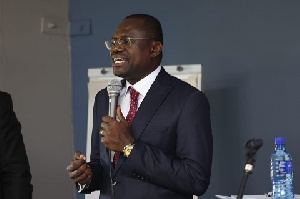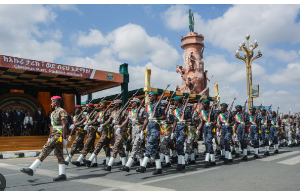EMBATTLED businessman Alfred Agbesi Woyome yesterday refused to subject himself to public scrutiny on the GH¢51.2million he allegedly received from the state as judgment debt.
Woyome’s solicitors, led by Osafo Buabeng, told the Public Accounts Committee (PAC) of Parliament that they could not comment on the matter because it was a case pending in court.
Incidentally, members of the ruling National Democratic Congress on the PAC put up a spirited defence, arguing in support of the self-styled financier of the ruling party as they insisted the committee should not hear the controversial matter because it was in court.
However, a member of the committee, Isaac Asiamah, criticised the NDC members, wondering why his colleagues would support an individual who was said to have defrauded the state by receiving GH¢51.2million from the public purse.
“We should all be protecting the public purse. I do not understand why my colleagues are not concerned about the public purse or money but would be speaking for someone who has brought lawyers here to defend him.
“We are here to protect our national interest, so why are we defending Woyome who has also brought his own counsel?” Isaac Asiamah, who is also the MP for Atwima-Mponua, lamented.
But the leader from the NDC side, Seidu Amadu, took exception to Asiamah’s comment, saying they were only insisting that the right thing be done.
Woyome had succumbed to appear before the parliamentary committee after Kan-Dapaah had threatened to call on the Inspector General of Police, Paul Tawiah Quaye, to arrest him for his failure to honour two previous invitations.
However, Woyome’s lead counsel, Osafo Buabeng, accompanied by his partner, Musah Ahmed, raised two preliminary objections, insisting their client would not speak because the issues being discussed at the PAC were being heard in court and therefore were subjudice.
“Mr. Chairman, we are of the view that the issues or matters that are being deliberated upon or discuss here are the same issues that are pending, one at the High Court, Criminal Division, one at the High Court Civil Division, another leg in the Court of Appeal and finally in the Supreme Court and therefore the issues are subjudice.
“Once they are subjudice, we would not be willing or taking part in the deliberation,” Mr. Buabeng stated.
“Second, there is evidence that the cabinet of the previous government truncated the process involving Mr. Woyome. Whether it was lawful or otherwise remains to be seen, but Mr. Chairman and another committee member, Mr. Hackman Owusu-Agyeman, were members of that cabinet. We therefore believe that there is a likelihood of bias. They should not be part of this matter if we choose to speak.”
Speaking in support of Woyome’s solicitors, Deputy Attorney General Anthony Gyambiby quoted article 137 (2) of the constitution which “states that neither the president nor parliament nor anyone acting under their authorities nor any other person whatsoever shall interfere with judges, judicial officers, or other persons exercising judicial power in the exercise of their judicial functions and all organs and agencies of the state shall accord to the courts such assistance as the courts may reasonably require to protect the independence, dignity, and effectiveness of the courts.”
This provision, according to him, made “it clear that when a matter is before a court, that same matter should not be sent or discussed anywhere else or it will be in contempt of the court. The Attorney-General has instructed me to say that it will not be appropriate for us to discuss these matters other than in the courts, so we will not say anything about the Woyome case lest we risk being in contempt of the courts.”
Giving his ruling, PAC Chairman Kan-Dapaah insisted Woyome should speak to the issues regarding the GH¢51.2million as they were not interfering with any court process.
“I am unable to accept the advice that we stop this matter on that account. I will accordingly rule that Mr. Woyome tell us his story with good conscience and the help of his lawyers,” he said.
Quoting Article 187 (5) among others, Kan-Dapaah said the Parliament of Ghana was not sovereign and that it was a creation of the constitution to which it is subject.
“In my opinion, it must follow its constitutional mandate and can thus not be held accountable to any conflicting subsidiary legislation. All the investigative bodies in Ghana must go through the Attorney General to prosecute their reports and cases, but for the auditor general, it must go through parliament. Is it the intention of the constitution that matters in court can’t be heard from Parliament? The constitution specifies when it does not want to hear such cases, but there is no such prohibition against parliament. Instead, the constitution says that an answer given to parliament by a witness cannot be used in court.
“This committee is not embarking on a judicial investigation and Woyome is not a defendant here; he is a witness. If a witness appears before the committee, he has the right to counsel and the right not to engage in self-incrimination. How can we do our job when material witnesses do not testify? The people of Ghana do not deserve the half-baked reports that would come out of such processes.”
He however adjourned sitting on Woyome sine die for various constitutional issues raised to be determined by the Supreme Court.
General News of Thursday, 13 September 2012
Source: Daily Guide













